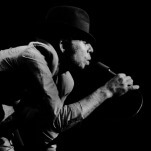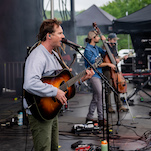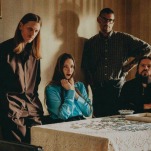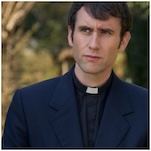Irish Rockers Fontaines D.C. Want to Bring Romance Back to the City
Photos by Daniel Topete, Molly Keane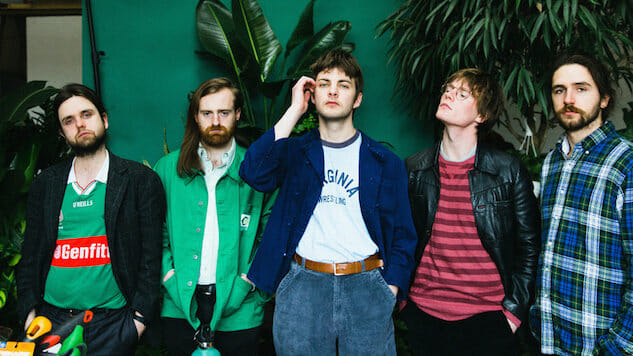
For generations, Ireland has been spat upon by other countries. The Emerald Isle has been relentlessly invaded, persecuted and caricatured throughout history, so it’s no surprise the Irish have an us-against-the world complex. Enter Irish rock band Fontaines D.C., who proudly bear the Dublin City initials at the end of their name and capture the real-life implications of the capitalist rat race on Irish people and culture. The young five-piece were one of the buzziest bands at this year’s SXSW, and their debut album, Dogrel, is out now on Partisan Records.
“We’re reflecting [Ireland] in a way that it pains us to see,” explains frontman Grian Chatten. “We’re proud to be Irish in a sense. It feels nice because Ireland is such a historically underdog country. It feels nice to wear our Irishness on our sleeves because it’s a voice that’s been shouted over for hundreds and hundreds of years.”
Post-punk is all the rage when it comes to on-the-rise bands from the other side of the Atlantic. Last year, you couldn’t swing a virtual dead cat without hitting an article about London’s Shame or Bristol’s Idles—two bands known for their ferocious live performances, playfully self-effacing lyrics and stout, melodic guitars. Fontaines D.C. have been loosely lumped in with both bands, having toured with them and generated similar levels of hype. Though a passive listener might dub Fontaines D.C. the next members of this bright and shiny post-punk “scene,” a more thoughtful survey of their work arguably uncovers more differences than similarities with their British counterparts.
Grian Chatten’s speak-sing delivery in a distinct Dublin tongue is one thing that sets them apart. His droney recitations never reach the kind of gravelly howl you’d associate with Shame or Idles, but his voice is no less expressive. You can’t miss those Irish rolled Rs when Chatten sings, “slick little boy with a mind of Ritz” on their snappy lead track “Big.” Chatten proclaims amidst lashing cymbals and a hopping bass line, “Dublin in the rain is mine / A pregnant city with a Catholic mind.” Despite piling onto the common criticisms of Ireland, their brutal realism comes from authentic personal experience and a desire to hold a mirror to their homeland’s face and empower it. Though with descriptions like “a cabbie [pissing] on the wheel of his own car,” “the breeze in the night time [that] would kill you stone dead” or “that violent ‘how do you do,’” Fontaines D.C. likely won’t receive any job offers from the Irish tourism board any time soon.
“We’re from the Liberties,” Chatten says. “It’s relatively rough, but it’s not as bad as it used to be. It’s kind of at the edge of the gentrification strip. It’s been surrounded by a dying culture that’s really potent inspiration. There’s a harshness as well. There’s drug use. At the same time, everybody’s so friendly. It’s a combination of friendliness and harshness that’s really inspiring.”
The five band members met in Dublin at college a few years ago and bonded over a shared love of poetry. They began writing together in the local pubs, a practice that continues to fuel the band’s spirit.
“People tend to believe the things they wish they could believe when they’re at a pub and drunk on the notion of romance,” Chatten says. “I use the themes that different people in Dublin bring to me. People who carry things with them. People carry stories just in the way they speak. When you overhear a conversation with that sort of emotion, it’s an invitation as a writer to feel something.”
Their debut album title, Dogrel, refers to a form of verse that has been historically looked down upon for being too crude, humorous and low-brow. Fontaines D.C. join a storied lineage of Irish writers who know better than to over-intellectualize and carry themselves with elitism—they prefer to speak both like the people and for the people. But that’s not to say they don’t have a way with words. Their tantalizing, picturesque descriptions couldn’t come from just any man yelling on a street corner, but their whip-smart, affecting lines would likely win over that same crazed man. They mention The Pogues and Dubliners by James Joyce as points of inspiration, and their naturalistic blarney has clearly rubbed off on the young group. Before the band fell in love with Joyce and other Irish writers like W.B. Yeats and Patrick Kavanagh, they were drawn to the Beat Generation.
“I’ve been reading poetry since I was 10-years-old,” Chatten says. “But it wasn’t until I was 15 or 16 that I started writing my own stuff and that was influenced by the Beats. That makes a lot of sense when you think about it because the Beats were great advocates of unfiltered self-expression. That philosophy encouraged me to accept my own writing. Once I felt like I was good enough, I allowed myself to be influenced by people that I really love now like Yeats and Keats and James Joyce.”
Though Fontaines D.C. have been thrown into the post-punk framework thanks to their droll vocals and occasional fits of spiky guitars, they are by no means a musical monolith. “Liberty Belle” is a straight-up surf rock cut with reverb-drenched guitars and saccharine backing vocals, “Boys in the Better Land” revolves around a swiftly-plucked garage rock riff and songs like “Roy’s Tune” and “Dublin City Sky” are the kind of tender-hearted ballads destined for the closing time blues. The sinister, unhinged slide guitar licks that open “Too Real” prove they’ve got a few tricks up their sleeves, and the song’s refrain (“Is it too real for ya?”) is indicative of their brazen-faced wit. They stitch together a wide array of influences ranging from classic garage rock bands, an Irish noise group called Girl Band and Britpop bands who painted gritty portraits of their own respective hometowns.
“The Libertines are very London and they’re very obviously influenced by English literature as well,” Chatten says. “I think we’re similar in that sense. Oasis are obviously very Manchester. I think I’m attracted to the power of Oasis. I’m interested in the idea of harnessing that power and pulling it into something a little more honed in, a little more literary and self-expressive. Oasis talked about ‘we.’ We talk about ‘I’ but it’s never really me that I’m talking about. It’s someone I identify with.”
Dogrel encapsulates the hope and entrapment that anyone with at least an ounce of awareness feels—and particularly millennials who have their whole lives ahead of them, but have to live in a world built by previous generations who ran amok without any consideration of consequences. That’s where the band’s authenticity comes in. On “Too Real,” they sing, “None can pull the passion loose from youth’s ungrateful hands,” and you can’t help but believe them because they believe in themselves. There’s a charming intensity to Chatten. When I ask about the source of the band’s self-belief, Chatten quips in an endearing, low grumble, “You reckon we have self-belief, do you?” There’s also something about an Irish band shouting “Sha, Sha, Sha” for a chorus that just makes you want to pound a military drum or punch the brisk Irish air.
“If I’m struggling with the emotion while I sing the song, then I know it’s because I feel it, you know?” Chatten says. “Every time I look at a river at the golden hour, my entire body feels like it’s melting or something. I get goosebumps all over my body. And that’s what happens when you come face to face with the truth and that’s what happens when we play our tunes that we believe in.”
When Fontaines D.C. perform, you don’t get the feeling that the floor is going to cave in—the stage floor anyway. The band doesn’t thrash around or dive into the crowd. When Chatten performs, there’s a level of seriousness and effortless magnetism that you wouldn’t get from a frontman more prone to confrontation. Though he’s not outwardly rambunctious, he’s not completely motionless either. He’s anxiously moving in some slight capacity at all times—even if it’s scratching his head or meandering around in a wired state.
The group’s appearance at SXSW last month drew crowds so large that many were forced to peer through venue windows or listen from the streets. Fontaines D.C. had only been to America once before to record a session for KEXP, so they weren’t exactly expecting hordes of people clamoring to get inside Austin, Texas venues, packed like sardines. Chatten was expecting sparse crowds of industry people with notepads, but after playing nine shows in five days, he says the adrenaline was “highly addictive” and invited an “alien energy.”
“It was crazy,” Chatten says. “We come over to America and we’re playing to actual crowds and people who know our lyrics and stuff, which I find mental. But I’m very happy about that because America is a place I’ve always wanted to understand and have more of a connection with.”
Dogrel mourns the loss of culture in urban cities, where independent venues fight to stay open, artists struggle to make a living and gentrification continues to displace people and wash away the old-world charm of yesteryear. Cultural discourse that once relied on word of mouth at the regular haunts has now largely relocated to social media—breeding grounds for isolation, superficiality, anxiety and reductive conversations about topics worth a lifetime of study. It’s hard to imagine another cultural renaissance unless something drastically changes in socioeconomic and political realms. If romance in the city is dying, where does that leave a rock band in 2019? With Fontaines’ interest in the Beats, Bob Dylan and ’60s garage rock, I asked Chatten if they wish their band could exist in a previous decade.
“No, actually,” Chatten replies. “Interestingly enough, I like the challenge of it now. I like trying to find how it can be relevant and discover how to make music that affects people.”
Like their resilient country, Fontaines D.C. fancy themselves in a David and Goliath scenario, and that’s one reason listeners find them so compelling. Their music video for “Big” sums up their sky-is-the-limit outlook as it follows a young Irish boy named Finn McGinnis (whom Chatten used to babysit and calls both “a funny lad” and “a bit of a genius”) roaming the streets and miming the lines, “My childhood was small / But I’m gonna be big!”
Fontaines D.C. don’t mind being thrown to the lions if it’s in the spirit of a good, old-fashioned challenge, and they might even throw some money on their chances. Another test they relish is their live show, but Chatten’s perspective on that arena might surprise people.
“I don’t really like having wild crowds,” Chatten says. “When we play Poland and places like that, it gets crazy and I think part of the reason I’m not mad on that is because it feels a bit too easy or something. There’s no winning over at all. The crowds are hardly even listening. The crowds are just there and they know all the tunes already and they just want to use the shows to blow off their own steam. I like a crowd that watches and listens but also a bit of moving as well.”
After ditching his “rotten job” at a hotel breakfast buffet and finding a true passion in self-expressive writing and rock music, Chatten isn’t looking back and neither are the other steadfast members of Fontaines D.C. They aren’t naive to the grind that’s required of a touring band in 2019, but there’s something pure about their desire to experience everything as passionately as possible. And what’s stopping them from pursuing their dream? They’re Irish for Christ’s sake.
Dogrel is out now via Partisan Records. Catch them on tour with Idles in North America in May. Click here for their full tour slate.
































